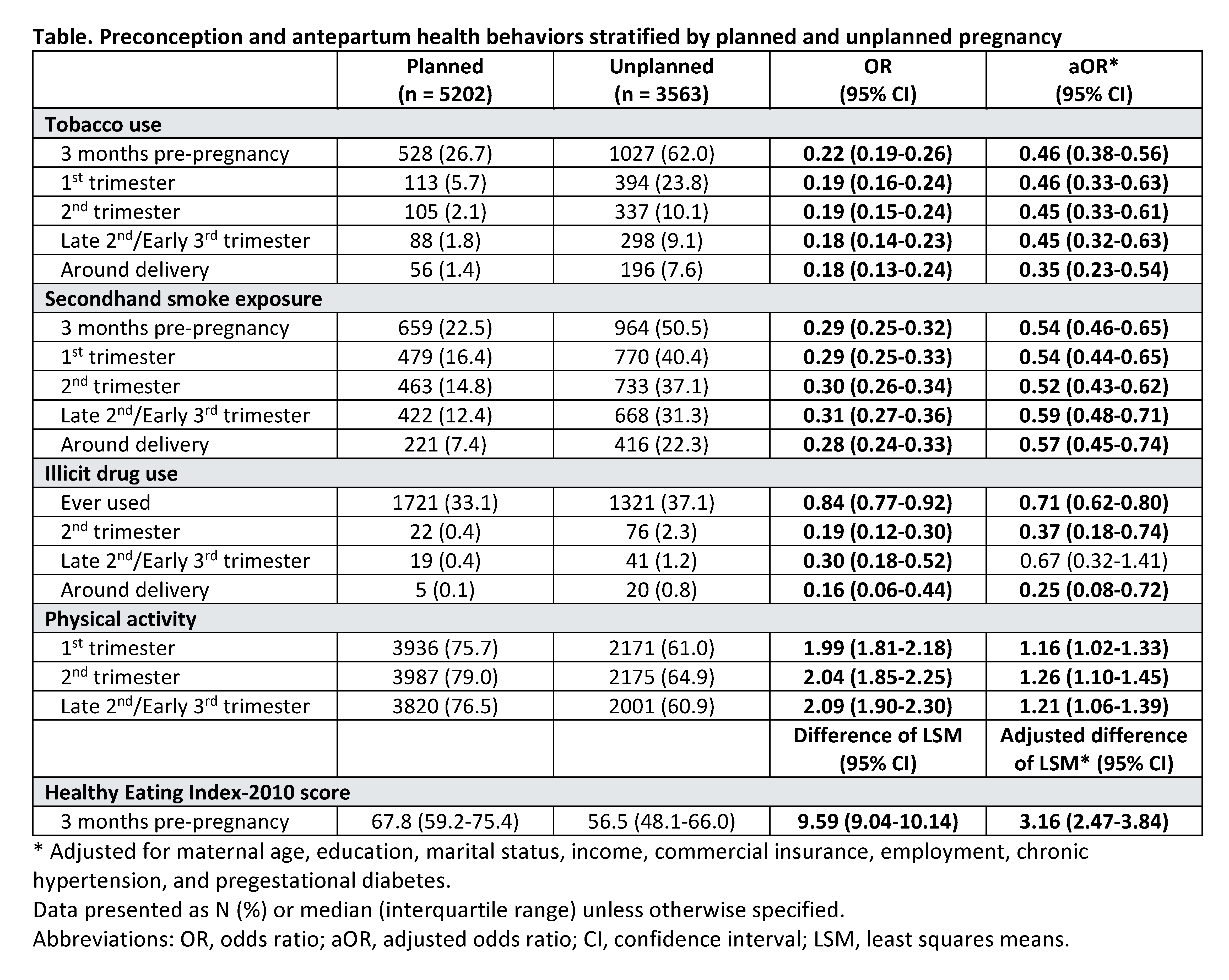Final ID: MP62
Health Behaviors Among Nulliparas With Planned and Unplanned Pregnancies
Abstract Body: Introduction: The relationship between pregnancy planning and health behaviors in the preconception and antepartum periods remains unclear. This study aimed to compare health behaviors before and during pregnancy between nulliparous individuals with planned and unplanned pregnancies.
Methods: This is a secondary analysis of the Nulliparous Pregnancy Outcomes Study: Monitoring Mothers-to-be. The present study included nulliparas who indicated whether their pregnancy was planned or unplanned. Preconception and antepartum health behaviors were compared between planned and unplanned pregnancies using bivariate and multivariate analyses.
Results: Among the 8,765 participants included, 5,202 (59.3%) had planned pregnancies, and 3,563 (40.7%) had unplanned pregnancies. Planned pregnancies were associated with older age, lower body mass index, white race, college education, higher income, and commercial insurance (p≤.001). Participants with unplanned pregnancies were more likely to have chronic hypertension and pregestational diabetes, and to be Hispanic or Latino, unmarried or unpartnered, and unemployed (p≤.001). In bivariate analysis, tobacco use, secondhand smoke exposure, and illicit drug use were more frequent among unplanned pregnancies three months preconception and throughout all three trimesters whereas engagement in physical activity was higher among planned pregnancies. Healthy Eating Index-2010 scores were also higher pre-pregnancy among planned pregnancies (Table). After adjusting for maternal age, education, marital status, income, commercial insurance, employment, chronic hypertension, and pregestational diabetes, these associations persisted (Table).
Conclusion: Nulliparas with planned pregnancies demonstrated healthier behaviors that included less tobacco use, secondhand smoke exposure, and illicit drug use and greater engagement in physical activity and healthy eating. These associations persisted beyond the preconception period throughout pregnancy. This underscores the importance of preconception counseling and interventions as they not only improve health behaviors before pregnancy but also sustain these healthy practices throughout pregnancy.
Methods: This is a secondary analysis of the Nulliparous Pregnancy Outcomes Study: Monitoring Mothers-to-be. The present study included nulliparas who indicated whether their pregnancy was planned or unplanned. Preconception and antepartum health behaviors were compared between planned and unplanned pregnancies using bivariate and multivariate analyses.
Results: Among the 8,765 participants included, 5,202 (59.3%) had planned pregnancies, and 3,563 (40.7%) had unplanned pregnancies. Planned pregnancies were associated with older age, lower body mass index, white race, college education, higher income, and commercial insurance (p≤.001). Participants with unplanned pregnancies were more likely to have chronic hypertension and pregestational diabetes, and to be Hispanic or Latino, unmarried or unpartnered, and unemployed (p≤.001). In bivariate analysis, tobacco use, secondhand smoke exposure, and illicit drug use were more frequent among unplanned pregnancies three months preconception and throughout all three trimesters whereas engagement in physical activity was higher among planned pregnancies. Healthy Eating Index-2010 scores were also higher pre-pregnancy among planned pregnancies (Table). After adjusting for maternal age, education, marital status, income, commercial insurance, employment, chronic hypertension, and pregestational diabetes, these associations persisted (Table).
Conclusion: Nulliparas with planned pregnancies demonstrated healthier behaviors that included less tobacco use, secondhand smoke exposure, and illicit drug use and greater engagement in physical activity and healthy eating. These associations persisted beyond the preconception period throughout pregnancy. This underscores the importance of preconception counseling and interventions as they not only improve health behaviors before pregnancy but also sustain these healthy practices throughout pregnancy.
More abstracts on this topic:
Advanced maternal age and association with major adverse cardiovascular events from NHANES from 1999 to 2018
Mehta Adhya, Honigberg Michael, Kennedy Jamie, Spitz Jared, Sharma Garima, Agboola Olayinka, Satti Danish Iltaf, Harrington Colleen, Scott Nandita, Sarma Amy, Saad Antonio, Sullivan Scott, Epps Kelly
Can We Diagnose Ticagrelor-induced Dyspnea After Urgent Percutaneous Coronary Intervention with Cardiopulmonary Exercise Testing?Giverts Ilya, Andreev Denis, Nanda Saumya

